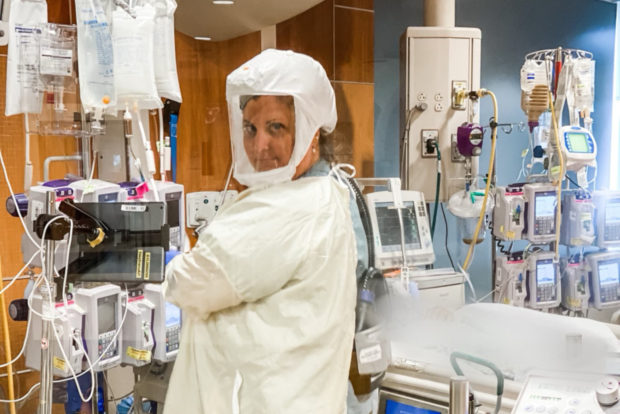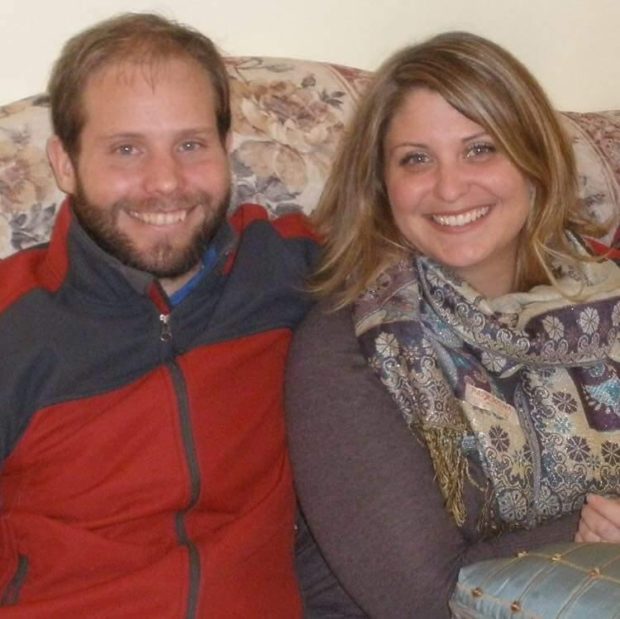As published in Columbia Journalism
Trials of an ICU nurse during a pandemic
Nidhi Upadhyaya

Nothing in her 15 years as an Intensive Care Unit nurse prepared April Weirich for the hardships and challenges of COVID-19.
When the pandemic hit in March last year, she was working in the 32-bed ICU of Lancaster General Hospital in Lancaster, PA.
“I can remember when it first started,” Weirich recalled. “We didn’t know anything — what we were dealing with or how contagious it was.”
Weirich, 38, made it through the first wave of the pandemic in the ICU, and after she graduated from Millersville University with a qualification as a nurse practitioner in September of 2020, she was promoted to Hospitalist in Internal Medicine. While she had made a decision to move on from her role as an ICU nurse, the pandemic reinforced it. Her new position, which is similar to that of a physician, has her seeing several patients for brief periods of time, unlike spending 12 hours with the same patient as an ICU nurse.
Weirich spoke about her life and career in a Zoom interview from her home, just a year after the start of the pandemic. She wore a deep blue hoodie and her light brown hair was up in a bun. Her green eyes had a faraway look in them as she spoke.
Weirich said that she wanted to work as a health professional since she was in high school. For a brief period, Weirich contemplated studying genetics but it was only when her mother said that she needed to be around people and not be stuck in a lab that she gave up the thought.
Born and raised in Lancaster, Weirich got her bachelor’s degree in nursing 100 miles away at the Bloomsburg University of Pennsylvania. It was during this time that her father Craig was diagnosed with stage four colon cancer.
They knew he wasn’t going to make it. Her decision to become a nurse was reaffirmed when she saw how well the nurses treated her father during his treatment. “I wanted to help people and sometimes helping people is guiding them through the end days of their lives,” she said.
When it came time to pick a unit to work after college, Weirich chose the ICU. Weirich still remembers her early days as a nurse. She was 22 and fresh out of college.
“It was terrifying,” she said. “I saw how sick people can be and that I can’t always make people better.”
She started with night shifts, and it took her a while to adjust to the schedule. The lack of sleep worsened her anxiety as she took care of patients in the hospital. Her most vivid memory is from the day she had a patient who coded — or, in technical terms, underwent cardiac arrest — and ended up dying. She was fine when it happened, but as soon as she reached home, she was hysterical.
“I was so young and so afraid of doing something wrong,” she said. “The more you deal with it, the more you get used to the fact that these things happen and we’re not in control of everything as much as we wish we were.”
Over the years, Weirich found it helpful to keep some emotional distance from her patients. This coping mechanism helped her process her emotions after a long day at work.
 Her older brother Craig, named after his father, once asked her, “What exactly do you do?” She replied, “I am whoever my patients need me to be. I go into one room and I’m a cheerleader. I go into the next and I have to be someone’s mom. And in the next, someone is dying so I’m compassionate.”
Her older brother Craig, named after his father, once asked her, “What exactly do you do?” She replied, “I am whoever my patients need me to be. I go into one room and I’m a cheerleader. I go into the next and I have to be someone’s mom. And in the next, someone is dying so I’m compassionate.”
Ten years into her nursing career, another tragedy struck her family in 2016. Her brother Craig died of a heart attack at the age of 37. It took her back to the early days when she felt like she couldn’t make a difference. His death made it particularly hard for her to go back to work.
Her relationship with dying patients has always been complex. Some of her hardest patients were those that were living their last moments and the laws demanded that the team keep working on them. It was extremely hard to keep fighting battles they knew they were going to lose all along.
On the other hand, some of her most meaningful moments were with patients who knew they were going to die. “If I’m able to ease some of that transition, even if it’s morphine or just emotional support, it means a lot,” she said.
During the height of the pandemic, Weirich’s six months in the ICU took a toll. In the beginning of 2020, the hospital nurses would try to keep nurses with health conditions or pregnancies out of the ICU dedicated for Covid-19 patients. But as the case numbers spiked, nobody had a choice anymore. Older nurses in the hospital had started getting their wills in order, younger nurses with kids were looking for alternative living arrangements and a few others were just hoping to make it through the day safe and sound.
On top of their normal duties, nurses were asked to clean rooms, struggle into isolation suits, and spend time on phone and video calls with families of patients. The hospital offered meditation breaks for only 15 minutes of reprieve. She scoffed, “Most of us weren’t getting lunch breaks. If we got 15 minutes, we were shoving a sandwich down our throats.”
Prior to the pandemic, the staff supplied their own scrubs. But as Covid-19 hit, they were worried about carrying the potentially infected clothes back home and had demanded the hospital supply them with an extra set to wear during work hours.
“We had to fight for the scrubs, but they eventually provided them,” Jessie Stefanescu, another ICU nurse, said. “We had goggles but they fit terribly. They would fall off. So, a majority of the nurses brought their own.”
They were told that N95 masks could be cleaned and surgical masks could be worn for a week. Stefanescu said, “They said there is a nationwide shortage. Two years ago, if you had a patient, you literally had a new mask every time you went into the room. Now we were using them for weeks on end.”
The normal of everything had changed. There wasn’t much time to question things or just fight back against it because they were all just trying to put their heads down and try to do what was necessary.
While other nurses were navigating personal relations during the pandemic, Weirich was grateful that she lived alone and didn’t have any kids. She didn’t have to worry about infecting anyone.
Towards the end, once she left the ICU, she realized how bad the environment was for their mental health. Nurses who were in the ICU towards the end of the year — when only the sickest patients were admitted there — saw death daily.
When she moved to her new job as a Hospitalist, she felt a sense of relief. She was very close to a burnout and was glad she had an out.
“It was hard seeing her as stressed as she was and not being able to be there,” her mother said.
Now, she can be found in the hospital in her favorite royal blue, wide-leg scrub pants and long sleeve t-shirts, doing her daily rounds and conducting meetings with nurses.
When Weirich moved into her new house recently — a project she took on during the pandemic along with her master’s degree — five of her nurse friends were there with their husbands to help.
A lot of friends she had that didn’t work in healthcare kind of fell by the wayside during the years, she said. The more she worked as a nurse, the less she had in common with them.
“Your filter gets a little funny and people don’t get it,” she said.
Now that she works one week on and one week off, Weirich hopes that she can think about romantic relationships again. Having gone into nursing at a very early age, she couldn’t dedicate the time to meeting and getting to know new people.
“By the time I came home from work, I was peopled out,” she said. “I would have to sit and decompress for an hour before I could even function to make dinner. So how can I try and start a relationship when I need so much to take care of myself?”
With her new free time, she is looking forward to traveling, working out and gardening again once Spring arrives and the weather is more pleasant. Her new house features a pool and a yard that her adopted dogs Fiona and Penny love to play in.
The pool is also new to her. Having never had one before, she went to the store to discuss what was needed to maintain it. The employee asked her if she would be able to handle it.
“How hard can it be? Cleaning a pool is basically dialysis,” she said.
